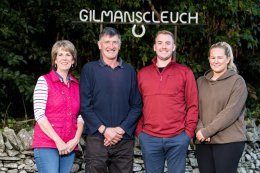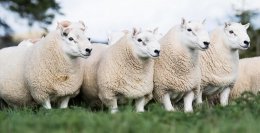
Gilmanscleugh
The Tennant family, Marjory, Tom, Andrew & Julie

Few breeds have improved more in the past decade in terms of size and scale than the South Country Cheviot, and coupled with the breed's longevity and fantastic mothering abilities which rivals that of any other hill breed, they prove to be the perfect fit for father and son duo, Tom and Andrew Tennant's Singlie flock based at Gilmanscleuch Farm, near Selkirk.
With the Southie able to withstand and thrive in the poorest of conditions and still prove to be a good breeding ewe that can be bred pure or crossed to any other breed is the sole reason for their dominance at Gilmanscleuch, which is farmed with the help of Tom's wife, Marjory and Andrew's wife, Julie.
Following their move to the farm in 2009, Gilmanscleuch totals some 400 acres of arable ground which is used for producing silage and whole crop, whilst the 1600 acres of hill ground is home to a closed flock of 900 Southie ewes and 25 pedigree Border Leicesters, 300 Cheviot Mules and Scotch Half-Breds, as well as a herd of 60 outwintered Sim-Luing cattle.
With so many breeds and crosses, it is nevertheless the Southie that is key to the overall profitability of this hill farming enterprise.
"I just love the versatility of the breed. The ewes on the hill work hard and always produce a tremendous crop of lambs every year on a low input system," commented Tom.
"Once ewes come off the hill they can be crossed and this is a trend that is being picked up with breeders below the border – as far south as Devon and Cornwall. More farmers are relying on them for producing fat lambs and the Southie is doing the job well, which I believe has elevated the breed even further and it's apparent when witnessing breeders travel up to Lockerbie to buy tups."
"They are also very hardy and easy kept, being a low cost all round female breed. Southie ewes are able to make the best of the poorest grazing and roughage on the hill, whilst still being able to thrive and produce two top quality lambs," Andrew added.
Producing quality lambs starts with the tups, and Tom and Andrew know exactly what they are looking for when it comes to selecting a sire.
"When buying in stock rams, we look for character and good bodies, with nice white hair and black muzzles. We also want something that has a good coat and skin to him, which will be passed onto his sons," explained Andrew.
One tup that has certainly left his mark on the Singlie flock is Becks Powerhouse, which was purchased at Lockerbie for £1800.
"His first crop of sons sold to a top of £3000 and averaged £1400 for nine sold in total. He was the sire of my pen leader last year, as well as this year's leader. He just had the character and quality we were looking for and it can be seen in his progeny coming through the flock," Tom stated.
"Another great stock tup would be Stirkfield Crusader, which we purchased at Lockerbie in 2020 for £4000. Half of our shearlings forward for this year's sale are his sons and he has also left good strong breeding females, which I am quite excited about," said Andrew.
"Each year at Lockerbie our averages are steadily creeping up but we’re still learning and I'm looking forward to judging the tups at this year's pre-sale show. Our highest price for a tup to date would be Singlie Musketeer which sold for £4000 at Lockerbie in 2010 to the Irvine's at Mountbenger. He had great breed character and lovely hair," Tom added.
Boys for Lockerbie, including the pen leader, a Becks Powerhouse son with others by Stirkfield Crusader, Catslack Hendo, and Drylea Ace of Diamonds

Tupping takes place in November with the aim of lambing in April for the Southie ewes, with 140 six-year-old draft Cheviots pulled off the hill and crossed to a Traditional Bluefaced Leicester ram to produce the farm's Cheviot Mules – which are lambed alongside the main Cheviot flock.
There is no such thing as special treatment at Gilmanscleuch either, with the hill ewes receiving a Rumevite mineral block from end of January through to lambing. Twin-bearing ewes are also shed off three-weeks prior to lambing and fed a small portion of ewe rolls to help with milk production and maintain condition, with any single-bearing ewes kept on grass out on the hill.
The farm's Cheviot Mule ewes – which are crossed to a Texel to produce prime lambs – are fed silage and ewe rolls and only brought indoors a few days prior to lambing for ease of management. Once lambed, all lambs receive a treatment for watery mouth and are moved back outside to grass. Once ewes are released back onto the hill with their lambs, they receive no feeding when rearing and are left to thrive on grass.
Tom's Border Leicester flock are lambed inside in the first week of March, with this year's crop comprising 12 tup lambs and 24 ewe lambs which are weaned off their mother's in July.
Weaning for the rest of the flock takes place in September, with the Texel cross fat lambs sold at 44kg deadweight through their local Farm Stock (Scotland) Limited unit, with last year's crop of 500 lambs selling to average £105.
Tom and Andrew retain around 45 Cheviot Mule ewe lambs per year as replacements, with the remainder fattened and sold alongside the farm's Texel cross lambs.
Within the main Cheviot flock, tup and ewe lambs are split at weaning with tup lambs moved onto grass and the best 60 retained for breeding potential. The remainder of the tup lamb crop are fattened on grass alone and sold deadweight through Farm Stock Scotland.
"Around 20 of those 60 tups picked out will then be selected for sale at Lockerbie and we also select around five to be sold through Lanark, with the rest being used on our own flock," commented Andrew.
"Over the past few years we have picked our best tup lambs and used them on some of the ewes but tend to wait until they are mature into shearlings before breeding with them."
Tups that are destined for Lockerbie are wintered inside in December and put out back outdoors when grass becomes more readily available. Around five-weeks prior to the auction, the sale rams are also fed a Norvite Tup Master blend to help with condition.
On average, the Tennant family take around 12 tups to Lockerbie per year, with last year's crop of 10 shearling cashing in at £900 and peaking at £1300 for the Becks Powerhouse-sired Singlie X-treme.
Across in the ewe lambs, around 280 ewe lambs are kept as replacements and wintered on grass alone with the remainder sold store to a finisher in Shropshire.
Out with the main Southie flock, Tom's other passion is his well-known Gilmanscleuch flock of Border Leicesters, which have enjoyed some notable successes over the years.
"We usually have stock forward for the sales at Lanark and Carlisle and this year has certainly been one to remember with the Leicesters following our Royal Highland Show victory this year, as well as winning the breed society's 125th celebration show of 140 entries at Carlisle, last year," Tom stated.
Just a few of the stock gimmers that will go to the tup this year.

It was a similar story in the sale ring too with a team of six ewe lambs sold through Lawrie and Symington's Lanark market levelling at £720 and topping at an astounding £1400 – setting a new record for a ewe lamb – whilst the tup lambs peaked at £2400 twice to average £1230 for seven sold.
"The sire of this year's sale lambs is Gortnagross Gleneagles which was bought at Ballymena last year for £1500 and he has left some crackers in the flock, however, we do need to mention Kinninmonth Galileo. We purchased him in 2020 at Lanark for £1700, and he sired our Highland Show champion. He's been the missing piece of the puzzle and just left lambs with much better quality about them," said Tom.
Also calling Gilmanscleuch their home is the family's collection of Clydesdale horses, comprising seven mares, one stallion and three foals.
"The Clydesdales have always been a part of my life with having taken over the reins from my father. We have enjoyed some show success over the years with them too, our best being reserve overall Clydesdale at this year's Royal Highland Show with the gelding, Singlie Gav. We are looking forward to attending the upcoming Aberdeen World Conference with our junior colt, Singlie Apollo," he added.
Focussing on the future of the breed, the Tennant family are confident that the South Country Cheviot can only flourish amongst the competition.
"The Southie has got a tremendous future ahead of her as she is cost effective and versatile – which is exactly what the modern hill farmer is looking for. There are few breeds where you can purchase five-year-old ewes at decent money that can then be pushed for a further two or three-years and still produce a quality crop of lambs," explained Andrew.
"With feed prices going the way they are, more folk may come over to them as they are a cost effective option for hill farmers. The hardiness is still there and that is the most important aspect. Us breeders have lengthened and modernised the breed but not to the point where they are not productive and in the next 25 years, the Southie will be the most improved breed across the board," added Tom.
"The market is there for the breed across all corners of the country and it's still early days but they’re heading to be the top option for hill farmers. It's especially refreshing to see an influx of enthusiastic youngsters coming into the breed, which will take them forward in the years to come.
"In terms of our flock, we will keep moving in the right direction and it's not going to happen overnight but we’re happy with the progress we are making within the breed," he concluded.
The Tennant family will have 12 South Country Shearling rams forward for sale at Harrison and Hetherington's Lockerbie show and sale, on October 10.
Batch of this year’s ewe lambs, with the best being retained and the remainder finished off the farm.

FARMfacts:
Farm – Gilmanscleuch is home to the Tennant family, Tom, Marjory, Andrew and Julie. Acreage totals 400 arable ground and 1600 acres of hill.
Sheep – Closed flock of 900 South Country Cheviot ewes, 25 pedigree Border Leicesters, 300 Cheviot Mules and Scotch Half-Breds. Some 140 six-year-old draft Cheviots are crossed to the Traditional Bluefaced Leicester to produce Cheviot Mules, which are then crossed to a Texel to produce fat lambs. Texel crosses are sold through Farm Stock Scotland, along with Cheviot Mules and South Country Cheviots that do not meet breeding standards.
Cattle – 60 Sim-Luing cattle which are calved outdoors and fed silage through the winter. Some 45 calves sold as yearlings through Farm Stock Scotland and local market, with the farm retaining six replacement heifers per year.
Clydesdales – totals some seven mares, one stallion and three foals which are home-bred. Clydesdales are shown with the biggest success being reserve overall champion at this year's Royal Highland Show.
(By kind permission of the Scottish Farmer)
